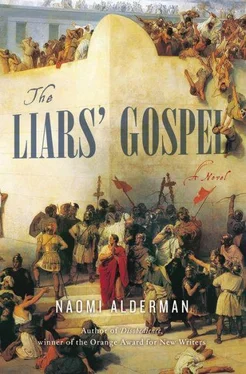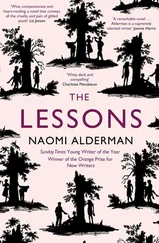Annas nods slowly. “He thinks you miscalculated. Good.”
Caipahas wants to point out the obvious thing, but cannot. For fear.
His wife says it instead. “He doesn’t know it was you, father, who miscalculated.”
Annas shrugs his shoulders. “Let him think he has a friend. You can play that part, can’t you, Caiaphas?”
Caiaphas, whose special gift is to lie so well he does not even notice himself doing it, says, “Everyone thinks I am their friend.”
The next day, he takes his wife on a long walk in the hills.
“Come,” he says, “while the countryside is safe and the bandits are quiet. Let us walk in the quiet of the hills and today another priest will perform the daily sacrifices.”
She looks at him oddly. For he is speaking oddly. And it is an odd request. But they used to do so when they were newly married. He brings wine with them, and a little dry bread and hard cheese. And skins of water, including one which he is very particular to keep separate from the rest.
The hills are stepped and dotted with cypress and twisted olive trees. The earth is red and yellow, and the path is dry. Lizards sit basking on rocks, blinking as they approach, too lazy to move. Their feet become dirty from the dust, but it is good to walk and walk, as if their bodies could outpace their minds. They talk of the children and the family.
He finds a shady place for them to sit. His wife is smiling now, puzzled, as if she did not know him. He does not know himself.
He passes her some of the bread and the cheese. They eat. They drink the wine. They are softened by the sun.
He says, and he had not known he would begin like this, “I have seen you with Darfon the Levite.”
Her whole body stiffens. Like the turning of the crowd when Pilate raised his hand and gave his signal and the soldiers showed themselves. He has revealed the traitor in her midst.
“I do not know who that is,” she says slowly and at last.
“I could take you to the Temple,” he says, “and bare your breasts in front of the high altar and accuse you of adultery. I could put that shame on you.”
She says, “You would not dare to do it.”
He shrugs. “I have never known you at all, I think,” he says. “You were only ever Annas’s daughter to me, and perhaps I was only ever a man suitable to be High Priest to you.”
She looks at him, her eyes dark and angry.
“If I were a man,” she says, “I would be High Priest and make a better job of it than my brothers.”
He gives a little nod to show that he agrees. This is not the matter at hand, though.
“I could divorce you,” he says, “but it would bring shame to the children and we want Ayelet to be married next year.”
“I did not lie with him,” she says.
And he shows her the wineskin of bitter waters. And tells her what it is. She starts to laugh.
“At your foresight,” she says when he asks. “At the plans you have made when Jerusalem was burning around you and men were slain in the streets.”
“It is the same thing,” he says. “It is all part of the same thing. All the different lies, and the plans, and the men we give them.”
“Yes, I know,” she says, shaking her head. “Do you think I have not heard all this before from my father? I know how it is. To keep the Temple standing, we do this and this and this, and—” She breaks off. Stretches her arms behind her so that he is reminded for a moment of Hodia’s daughter.
She snatches the wineskin from his hands. Looks into his eyes.
She says, “My father told me about applying this curse to women suspected of adultery. He said that often they never had to drink the water at all. That women who were guilty would start to weep and shake when they saw the bitter waters and confess. And those who were innocent would drink it down without fear.”
She says, “I swear I am no adulteress and may all the curses of heaven fall on me if I am.”
She meets his gaze as she drinks and drinks, gulping it down, some water spilling over her chin, drinking it all until the wineskin is empty and she takes it from her mouth and her mouth is full of water. She does not look away from him as she takes the last gulp. She wipes her mouth and chin with her forearm. She throws the wineskin at his feet.
They walk back to Jerusalem together, not talking. She does not help him when he stumbles. He does not give her an arm over the high stone wall of a farm. The silence between them is as thick as woolen fleece. But still they walk together. For there is a presence howling and prowling on these hills and, if they separated, they would become prey for the wolves.
Nothing is settled forever. Every peace is temporary.
The dove sellers come before him again, this time one with a blackened eye and another with a tooth missing.
It is a man in his forties who brandishes the tooth like a nugget of gold.
“Do you see what they’ve done to me? Do you see? Those mongrels, those monsters, that pack of dogs!”
This time he bans several of the men from the Temple courtyards altogether, and tells them to make reparations for the disturbances amounting to more than a talent of gold in total. It cannot go on like this, and yet there is no other way for it to go on.
The brother of Eliken — the eighteen-year-old priest who died in the riot in the plaza — comes to visit him. His name is Shlomo, the brother, he had not thought to ask that before, or perhaps he had forgotten the name. Shlomo’s wife has given him four living sons, thank God, and the eldest is now approaching thirteen, when it will be time to begin his Temple service. The son belongs to the Temple, as do all male children in the family of the priests.
“Perhaps,” says Shlomo, “you would be prepared to meet the boy? To offer him some guidance? He remembers his uncle Elikan with great fondness.”
And Caiaphas knows what Shlomo is asking.
“Is he with you?”
Shlomo brings the boy in. He is gangly and nervous, with a voice on the edge of breaking which wavers from high to low pitch within a single sentence. He does not speak much.
“What is your name?” says Caiaphas, trying to be kind.
“Ovadya-Elikan,” says the boy.
“He took on the name himself, after his uncle died,” says Shlomo proudly.
“Come to see me Ovadya-Elikan,” says Caiaphas, “when you begin your service. And we’ll make sure you get to know everyone in the Temple.”
Shlomo is grateful. He himself serves his turns at the Temple offices but has never had a friend in such a high position before. Much good may it do him, thinks Caiaphas.
Natan the Levite tells him that Darfon, son of Yoav, will set out this very afternoon for the north, where his strong arms will be of the greatest use in loading barrels of wine and oil onto carts and his cunning brain will be most welcome in figuring the accounts. Caiaphas feels a certain relief at that, but then at once his mind starts to seek out whom his wife might turn to now, in Darfon’s absence. He cannot send every man in Jerusalem to the north.
“And Pilate wants to see you,” says Natan. “No,” he continues, before Caiaphas can ask the question, “he didn’t say why and I didn’t ask.”
They look at each other. Every peace is temporary.
Pilate is full of himself. The rebellion has been quashed; Rome surely sent disapproving words merely to placate their own guilty consciences. But he has acted strongly and rightly. This is how a Roman man behaves.
He greets Caiaphas warmly. There is no soldier standing guard today.
“Can you sense the mood in the city, Caiaphas?” he asks. “They have felt the touch of my power. They know who is their master now, and they have given up all resistance like obedient slaves.”
Читать дальше












